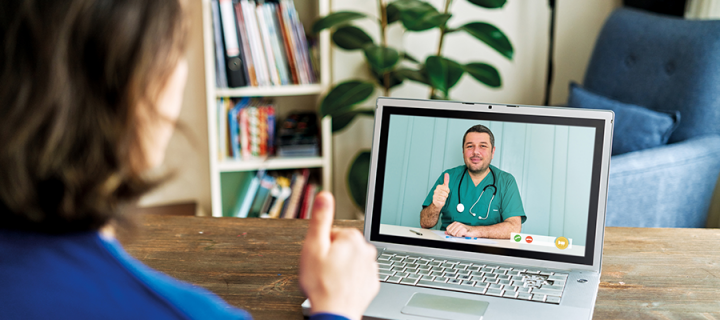Remote consulting: an evolving norm - speaking to the Scottish Parliament's Cross Party Group on Lung Health
The Centre presented the academic, clinical and patient voice on remote consultations to the Scottish Parliament’s Cross Party Group on Lung Health
Members of the Asthma UK Centre for Applied Research were invited to present to the Scottish Parliament’s Cross Party Group on Lung Health this September.
Led by the Centre’s Advocacy Lead, Monica Fletcher, our members spoke about the role of remote consulting in asthma care and presented academic, clinical and patient viewpoints. The swing to fully remote consultations during the pandemic was discussed and questions around which elements should be retained were raised.
Academic viewpoint
Centre Director, Professor Aziz Sheikh began the presentation outlining four policy-focused pieces of research with a focus on asthma that have been carried out during the COVID-19 pandemic.
He discussed:
- A study that identified adults at increased risk of COVID-19 hospitalisations and deaths
- An investigation of the impact of lockdowns on chronic respiratory diseases
- A study identifying children at increased risk of COVID-19 hospitalisations and deaths
- A project which aims to understand the risk factors for serious post-vaccination breakthroughs
Aziz mentioned the comprehensive data resources in Scotland that help researchers answer some of the questions that are asked by Scottish and UK decision makers.
How to provide care for people with asthma during the pandemic

For over 20 years, Centre member, Professor Hilary Pinnock has been carrying out academic work alongside her clinical career as a GP. She presented evidence from her studies into asthma self-management, and her work on how effective remote consultations can be.
Moving into the pandemic, there has been a major swing from reluctance to use telephone or digital consultation methods, to them being a necessity for infection control. Hilary discussed the dramatic structural re-organisation that has occurred in general practices across the country to accommodate the need for social distancing.
The impact of these changes on people with asthma was profound: in Scotland, and mirrored in the other UK nations, there was a dramatic fall in admissions compared to the pattern over the previous 5-years. Some of the proposed reasons for this include:
- Reduced transmission of all infections due to lockdown
- The move to remote consulting and the organisational changes to separate infection from people ‘at risk’
- Improved adherence to preventer medication
- People self-managing rather than attending hospital
Hilary presented evidence that by September 2020, total numbers of consultations in general practice had recovered to pre-pandemic levels, and the swing between remote and in-person consultations was beginning to rebalance.
Historically, remote consulting has been shown to take less time than a face-to-face consultation but it is likely that this is because they are more focussed and task orientated. Typically during remote consultations, only one problem is presented whilst face-to-face consultations often address multiple. Patients and clinicians agree that remote consultations are convenient for straightforward tasks, but complex, multi-faceted issues should be discussed in person. Some GPs described how they missed the personal touch of talking and sensing a patient in the room. There were also concerns that the enforced use of remote consultations for infection control removed choice: not all patients can or want to use telephone or digital methods of communication.
Asthma patient perspectives
Two of the Centre’s Patient and Public Involvement members spoke to the Cross Party Group on their experience of remote consulting and how care has been adapted during the pandemic.
David Weatherill discussed patient experiences with having consultations during lockdown. They were relatively straightforward: generally, they worked quite well and helped to filter problems that didn’t need a surgery visit. However, it was difficult to measure things like oxygen levels or to make a diagnosis, and he was concerned that they weren’t appropriate for older patients or those with multiple medical problems.
Noelle Morgan spoke about her involvement in one of the Centre’s key programmes, IMP2ART which aims to help general practices embed supported self-management into routine care. One of the initiatives was a focus group gathering patient views on living with asthma. This data has then been fed into the “Living with Asthma” website that GPs can offer to people with asthma. Here, they can find resources on managing their asthma and links for further support if required.
The future for remote consulting
While remote consulting has brought some positives for people with asthma, including reducing the spread of infection and encouraging supported self-management, both of which may have led to the reduction in attacks that were observed during the pandemic, it is not suitable for all conditions and tasks, and it doesn’t take into consideration the personal choices of patients, clinicians or organisations.
We have an opportunity as we rebuild healthcare for people with respiratory or other conditions: to learn the lessons of the pandemic and shape the delivery of care to a new - and better - norm. Our request to the MSPs on the Cross Party Group for Lung Health is to support clinicians and healthcare organisations in rebuilding services that are appropriate, equitable and accessible – and importantly, that offer choice to suit the patients, clinicians and the service.
Image: pinstock via Getty Images

